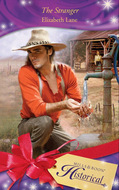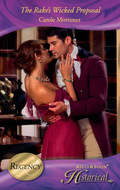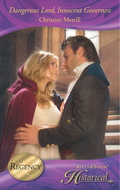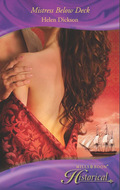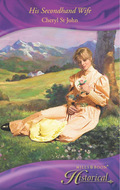This book cannot be downloaded as a file but can be read in our app or online on the website.
Read the book: «Reforming the Rake»
“Since we’re not friends, may I ask you a rather rude question?”
Beatrice blinked. “Excuse me?”
Charles’s green eyes sparkled devilishly. “Why aren’t you married?”
“A great many people aren’t married,” she retorted defensively. “I could be asking you the same question.”
“Yes, but I don’t want to be married. The fact that you’re in London for the season implies that you don’t share my sentiments. What’s stopping you? You’re intelligent and amusing, not to mention,” he added quietly, his eyes darkening, “the most beautiful woman in town. Are you sure you’re really looking for a husband?”
Beatrice colored again. “Are you proposing?” She knew that she shouldn’t have asked him this question—there was no telling what sort of outrageous answer he’d give—yet the question had slipped out all the same.
Charles leaned in closer yet again, this time to whisper in her ear. “Not marriage.”
Praise for debut author Sarah Elliott
“Sarah Elliott has a fresh new voice that makes the marriage of convenience into something altogether too sexy and fun to be just convenient!”
—New York Times bestselling author Eloisa James
“Sarah Elliott writes with elegance and wit. The book is funny, it’s sexy, it’s romantic. What more could you want?”
—Jessica Benson, author of The Accidental Duchess
Reforming the Rake
Sarah Elliott

MILLS & BOON
Before you start reading, why not sign up?
Thank you for downloading this Mills & Boon book. If you want to hear about exclusive discounts, special offers and competitions, sign up to our email newsletter today!
Or simply visit
Mills & Boon emails are completely free to receive and you can unsubscribe at any time via the link in any email we send you.
This book is dedicated to Laura Langlie for her patience and tenacity and to Elizabeth Sudol for giving much-needed encouragement.
Contents
Chapter One
Chapter Two
Chapter Three
Chapter Four
Chapter Five
Chapter Six
Chapter Seven
Chapter Eight
Chapter Nine
Chapter Ten
Chapter Eleven
Chapter Twelve
Chapter Thirteen
Chapter Fourteen
Chapter Fifteen
Chapter Sixteen
Chapter Seventeen
Chapter Eighteen
Chapter Nineteen
Chapter Twenty
Chapter Twenty-One
Chapter Twenty-Two
Chapter Twenty-Three
Chapter Twenty-Four
Chapter Twenty-Five
Chapter Twenty-Six
Chapter Twenty-Seven
Chapter Twenty-Eight
Chapter Twenty-Nine
Chapter Thirty
Chapter Thirty-One
Chapter Thirty-Two
Chapter Thirty-Three
Chapter Thirty-Four
Chapter Thirty-Five
Chapter One
May 12, 1816
C harles Summerson, ninth marquess of Pelham, hadn’t meant to spy. No, he actually felt rather embarrassed for not closing his window right away—after all, he’d merely stuck his head out to check the temperature, and, having decided that he would not require a heavy coat for his ride in the park, had no reason to linger.
Nonetheless, he lingered.
It wasn’t even Charles’s own window, for that matter; that is, it was his former window. He was temporarily staying in his boyhood room at his mother’s Park Lane home while his own town house underwent repairs. Still, he had grown up in that very room, and in all those years he had never appreciated how prime a vantage point his window was for observing the goings-on in his neighbor’s garden. Not that he’d ever been particularly interested in her goings-on before, and frankly, he wasn’t interested in them now. Lady Louisa Sinclair had lived next door to the Summersons for as long as Charles could remember. She was one of those society matrons who was perpetually just shy of sixty years old…preserved, he assumed, by the vinegar that ran through her veins.
Today, however, was different, for today Lady Sinclair was not in her garden. Quite the contrary. Instead, there appeared to be an entirely different variety of female in his neighbor’s garden: definitely younger, and far gentler on the eyes.
Charles quietly observed the unfamiliar girl for several minutes without moving. He hadn’t the faintest idea who she was, and from his position he could make out few details. She was sprawled out in the middle of Lady Sinclair’s pristine lawn, facing away from him. and propped up by her elbows in order to jot something hurriedly into a small book. Charles wished he could see her face. All he could really see was the back of her blond head, bent so avidly over her writing.
He let his gaze travel down her body, or what he could see of it, anyway. She wore a pale yellow dress, the same color as Lady Sinclair’s daffodils, and Charles noted that it was appropriately, albeit disappointingly, modest. He had to rely on his imagination to fill in the details that the dress concealed: a tall, slim frame, gently rounded hips, small waist…ample breasts. He silently willed her to roll over and satisfy his curiosity.
Her legs lay flat behind her, and Charles let his gaze roam down even farther. He noticed that her slippers had abandoned her feet and now lay haphazardly on the ground at her side. He could see nothing of her calves—as was proper—but he could see her feet quite clearly. Periodically, she wiggled her toes in the grass.
He knew he really ought to turn away, and surely would have if it weren’t for those damned feet. But seeing a woman’s stockinged feet only made him all the more curious to see the rest of her, and as she was so focused on…well, whatever it was she was doing, there was really no chance of being discovered, was there?
After a minute, the girl paused in writing to leaf through the pages of her book. Charles would have given just about anything at that moment to read along with her—rather salaciously, he hoped that it was her diary, where she recorded her deepest secrets, hidden desires….
He forgot about the contents of her book entirely, however, when—seeming to forget for the moment that she was a young lady—the girl bent her leg back, letting it sway carelessly back and forth; her skirts slipped down to pool around her knee, and he was treated to a clear view of her trim ankle and shapely calf.
He raised an eyebrow in appreciation. Charles supposed he ought to feel rather depraved for observing her unawares, but niggling morals aside, he just couldn’t avert his eyes. He even contemplated heading down the hall to knock on his sister’s bedroom door to ask if he could borrow her opera glasses.
However, his nefarious thoughts were interrupted before he could make that decision. The sound of a shrill voice rang out from next door—probably that termagant Louisa Sinclair. “Bea! Come inside now! We have to get ready.”
“Coming….” The girl responded slowly, without closing her book or making any sign to rise.
After a minute, the voice came again, more insistent this time. “Bea! We’ll be late as it is.”
With great reluctance, the girl closed her book, but she didn’t get up right away. First, she rolled onto her back, stretching like a cat and crossing her arms behind her head. She looked up at the sky, a faraway expression on her face and the faint trace of a smile about her lips.
Charles really should have looked away then. She could have turned her gaze up toward his window at any moment, and he’d feel like ten times a randy schoolboy, which wouldn’t do at all. But the problems that discovery posed were the furthest thing from his mind. For a moment, in fact, he forgot to breathe.
God, she was beautiful. He’d been admiring her body before, but her face… Perfect, tiny nose and generous lips… Charles swallowed hard. With her lying on her back as she now was, his prior imaginings were confirmed. She was indeed slim, but definitely curved in all the right places. He still couldn’t see all that he would like—the color of her eyes, the slant of her brows—but the general picture of beauty was undeniable.
Charles wondered at her age. She was definitely young, he decided, but not too young…twenty, perhaps? Twenty-one? He tended to avoid innocents, for the simple fact that they were usually looking for husbands, and he definitely did not fit that category.
Holding her book close to her chest, the girl rose and began walking toward the door. She paused, however, just before entering, tilting her radiant face up to the sky to enjoy her last few seconds of sun. Then, with a look of disappointment, she headed indoors and broke the spell.
Charles waited to see if she’d reemerge from the house. After several minutes had passed with nary a sign of her, a more profitable course of action came to his mind.
Charles rose from his position at the window and left his room, heading down the long hall to knock on his sister’s door. He ignored the portrait of his great-great-grandfather, who glared at him disapprovingly from beneath his abundant eyebrows.
“Lucy? You in there?” he called through the panel. At eighteen, Lucy was having her first season. Despite the twelve years age difference, they had always been very close, although Charles was still trying to get used to the fact that she was no longer a child.
Lucy opened her door and grinned at him. She was a pretty, petite girl and shared her brother’s raven-black hair and green eyes. Indeed, except for the fact that Charles stood well over six feet tall, the resemblance between them was uncanny. “Did you miss me, Charles?” she asked cheekily.
He snorted. “Don’t flatter yourself, Lu. Came to see what you were doing tonight.”
She arched a single brow. “Could it be that you’re interested in accompanying me? That would be a first.”
“I went along for your debut two weeks ago,” he protested.
“That doesn’t count, and you know it. You had to come. Besides, you told me that would be the first and last time.”
He had said that—he could remember his words distinctly. “Perhaps I’ve changed my mind. What are the entertainments for the evening?”
“Just one that I know of—the annual Teasdale ball. That’s where I’m going.”
Charles nodded, as if debating whether to attend, but he’d already made up his mind. There was little he’d rather do less than attend Lady Teasdale’s blasted ball, but he wanted to know more about the girl in the yellow dress. Lady Sinclair had ushered her inside to get ready for something, probably this particular function. “Perhaps I’ll come along.”
“But you can’t stand Lady Teasdale!” Lucy exclaimed.
Charles realized this conversation wouldn’t be as brief as he’d hoped. He entered Lucy’s room and sank into her large armchair, trying to come up with a plausible excuse. “I realize that I’ve been lax in my duties, Lu. I shouldn’t leave you to face the vultures alone.”
“Charles, Mother always comes with me. It’s not as if I’m without a chaperone.”
“Ah, but you forget, Lucy, that Mother doesn’t know the men out there as I do. I should hate to see you wasting your time with the wrong sort.”
She gaped in disbelief. “How can you be so suspicious? You’re the worst of the lot, Charles. And did it ever occur to you that maybe I don’t want your blasted company?”
He pretended to look shocked. “Can these be the words of my own dear sister?”
Lucy wasn’t about to give up. She loved her brother dearly, but he could be a tad overprotective at times. She tried to put him off one last time. “Well, whether I want you there doesn’t matter. Besides, you’ll make Mother very happy. Just this morning she was telling me that it was high time you wed.” She batted her eyelashes innocently.
“Mother says as much every day.”
“Well, Charles…” Lucy was really warming up to the subject now. “I haven’t told you this before, but Mother has really been thinking about finding you a match recently. Seems she’s getting worried that you’ll never wed.”
“This is new?” he asked with a yawn.
She ignored his rudeness. “Well, no, not that in particular. But she has taken up an alarming new practice of carrying a notebook containing the names and parentage of every eligible girl she meets. Truly, Charles, she is never without it.”
He just stared for a moment, his mouth slightly agape. “She’s taking notes? What does this notebook look like, Lucy?”
She debated whether to tell him or not—what if he went looking for the book and stole it? Her mother would never forgive her, not to mention that Lucy would no longer be able to hold it over his head. But she knew he’d get the information out of her sooner or later. She tried to describe the book as vaguely as possible. “Well, I can’t say that I’ve seen the outside of the notebook too often…it’s always open when I see her with it. But I do believe it’s leather. Oh, and small, so she can fit it in her pocket.”
Charles had spent several years after university working for the War Office and easily recognized evasion. But his sister was as formidable as any French spy he had ever encountered, and he decided to drop the questioning for the moment. He’d find and destroy the book later.
“You’re very helpful, Lu. I can’t thank you enough…and I shall see you later this evening.” And with a roguish grin, he rose from the chair and headed back to his room, deciding that his ride in the park could wait.
Chapter Two
B eatrice Sinclair sat very still, holding a slender pen poised over a blank page in her well-worn journal. She wrote three words, but crossed them out almost immediately. She waited for more words, better words, to spill forth. They didn’t.
Frowning, she laid her notebook on her lap, realizing she was too distracted to give her writing the thought that it deserved. How could she concentrate on fiction when reality—her personal reality—was in such a shambles?
She looked around her bedroom for literary inspiration. The walls of her great-aunt Louisa’s house were papered, variously, with pastoral scenes or with complicated floral motifs. Beatrice’s bedroom was a pastoral room. Shepherds and milkmaids cavorted about the walls, and had the added bonus of having trompe l’oeil clouds painted on the ceiling. Personally, she would have preferred to be outside, but Louisa had just called her back indoors; she disapproved of young ladies getting too much sun. A single freckle could spoil a girl’s chances completely, or so she claimed.
Beatrice turned her attention back to her journal and sighed. She’d kept it since her first season, five years earlier. Initially, it had been a diary in the true sense of the word, a place where she’d related each day’s events—Beatrice had quickly realized that if she didn’t occupy her mind in some useful fashion, she’d risk becoming as empty-headed as the rest of the ton. However, as the season drew to a close and she read over her diary, she’d realized bleakly how dull her life had become: party after dinner after ball, all with the sole purpose of snagging some unsuspecting male. It wouldn’t have been so bad if she’d been even slightly interested in any of the gentlemen she met at these endless social events, but she had a difficult time dredging up the faintest enthusiasm for most of them.
By the end of that first season, Beatrice had resigned herself to one thing: in looking for a husband, reality and fantasy would never agree, and the less imagination one had, the better. Where were broad shoulders in the real world? Razor-sharp wit? Tall, dark and handsome? Clearly, these things didn’t exist, and if one could accept that, one would never be disappointed by reality.
Unfortunately, this revelation came too late. By the end of her first season she’d earned the moniker “Cold Fish Beatrice” for her repeated refusals. By her second and third seasons, the many proposals she’d once received had all but dried up.
So she’d spent two years at home in the country and now—older, wiser and much reformed—she was ready to embark on yet another season. This time, though, she had a plan. Wisdom helped her realize that she needed an outlet for her imagination, so, at the sage age of twenty-three, Beatrice had stopped keeping a diary and had turned to fiction. This way, she hoped, she could invent whatever romantic hero she pleased, and resign herself to the stooped shoulders of reality.
So far, her plan wasn’t working out as she had expected, but the season was only a few weeks old.
“Beatrice, this is not acceptable.”
Louisa was glaring at her with extreme annoyance. Even when pleased, her great-aunt was a sight to behold, with her steel-gray hair, her steel-gray eyes, her long nose and her tall, thin body. When Louisa was irritated, however, intimidating took on a whole new meaning. She could incite fear in the stoutest of hearts with a simple curl of her lip, and all that saved Beatrice from quaking in her seat now was the knowledge that, deep down—very deep, perhaps—her aunt was generous, caring and devoted to her family.
Beatrice was afraid she knew what “this” meant, although she asked all the same, biding for time. “I’m sorry, Louisa—what precisely is not acceptable?”
Louisa snorted indelicately. “Your sister informs me that you don’t plan to attend Lady Teasdale’s ball this evening. Why did you not discuss this with me?”
Beatrice began guiltily, “Well…Eleanor mentioned something about there being a new production of King Lear at Drury Lane, and that she had no one to attend with her—”
“Beatrice, you already promised that you’d go to Lady Teasdale’s. Besides, Eleanor is only sixteen! She hardly needs to be going to the theater. I should never have told your father that she could come visit you, even if it was for only a few weeks. King Lear. Humph,” Louisa sniffed. “There’s a man with three daughters for you…and look what happened to him. It’ll only give Eleanor ideas. I’m just glad Helen isn’t here to see it.”
“I think you’re being a little dramatic, Auntie. You couldn’t find three daughters more devoted to their father than Eleanor, Helen and me, and I can assure you that Eleanor’s motives are innocent. She just loves the theater.”
Louisa rolled her eyes. “Back to the subject at hand, Beatrice. Truth is, Eleanor knows that you don’t want to go to the Teasdales’, and as she’s too young to go herself, she figures there’s no harm in you missing the ball.”
“Is there?” Beatrice asked hopefully.
Louisa assumed mock disbelief. “Have you gone off and gotten married without telling me, Beatrice Sinclair? Of course there’s harm in missing the ball—you’re a desperate case.”
Beatrice was used to these comments and knew that Louisa didn’t really mean them…not entirely, anyway. She put on her most innocent face, which was sure to irritate her aunt. “I can’t believe you would accuse me of avoiding Lady Teasdale’s.”
Louisa snorted again. “Do I look like a fool? You’ve been telling me that you didn’t want to go since arriving here last month. Yes, Lady Teasdale is tiresome, but her balls are always well attended, especially by eligible young men.” She sighed. “You’re not even giving it a chance, Bea. The season has been in full swing for two weeks, and I made your father a promise.”
“I know, Louisa…. I only thought that, as I have already been to Lady Teasdale’s annual ball three times in the past—without, I should remind you, much success—”
“Who needs reminding? Clearly, you are not married.”
Beatrice counted to five, praying she wouldn’t lose her temper. “Clearly.”
“And how old are you?”
She almost didn’t answer. Louisa managed to mention her age at least twice a day, and Beatrice had little doubt that she knew precisely how old she was. “I am twenty-three, Louisa, a fact we have already established. I will inform you when this state of affairs changes.”
Louisa clucked. “Impertinent chit. That’s what you get for being long in the tooth.”
“What?”
“With age comes a sharp tongue.”
That’s what I get from spending the past month with you, Beatrice thought, but said nothing.
“At any rate,” Louisa continued brusquely, “I have discussed matters with your sister. She is determined to go to the theater, and I have decided to allow it—if, mind you, you can get your brother to join you.” Beatrice groaned, and Louisa cackled with glee. “Yes, dear, I know that won’t be easy. Ben’ll be as excited about chaperoning his younger sisters to the theater as I am about the two of you going. I don’t think it’s right for two unmarried girls to be traipsing off to the theater together. I don’t know what the world is coming to.”
Beatrice sank back onto the settee. Louisa was right. Ben would have no desire to escort them to the theater, and he probably already had other plans. Still, if she started begging now, by curtain call he’d be so annoyed he’d take them just to make her be quiet. Beatrice wanted to crow with joy, but wisely schooled her features. “Thank you, Louisa. I know how much this means to Eleanor. I’d hate to disappoint her.”
Louisa smiled smugly. “Yes, well, I checked, and the play begins at seven. You should still be able to make it to Lady Teasdale’s at a decent hour once it’s over. And see if you can’t get your brother to come with you.”
And with that, Beatrice’s hopes sank into the carpet, and Louisa sailed from the room with all the dignity of the royal barge. Beatrice collapsed even deeper into the settee, and closed her eyes. It didn’t help; she could still see the triumphant smirk on her aunt’s face. She opened her eyes and looked at the frolicking milkmaids on the walls. Even they looked smug.
Oh, she was dreading the evening to come. It was true— Beatrice had been to Lady Teasdale’s wretched affair three times already. It was considered de rigueur for unmarried young ladies to attend this annual event, and avoiding the thing in the future was one of her few incentives for marrying. Lady Teasdale had five daughters to still marry off and was a cutthroat competitor who made a point of being rude to any ladies of marriageable age not related to her by blood. Lady Teasdale’s eldest daughter, Sarah, had come out the same year as Beatrice. Lady Teasdale liked to remind Beatrice of the fact that Sarah had been married by the sixth week of the season—and to a viscount, no less. In truth, Beatrice felt sorry for the girl—she couldn’t imagine anything worse than being auctioned off to the highest bidder at the age of seventeen. But that didn’t change the fact that Lady Teasdale considered it her job to rub that detail in everyone else’s face.
Of course, Beatrice had to admit that three seasons without managing to find a husband was rather pathetic. And if one counted her two years of restorative hibernation at her family’s home in Hampshire, well…that did make five years of indisputable failure.
Not that she considered it to be her sole purpose in life to get married. She had no problem with remaining single…as long as she wasn’t trying to wed; it was at that point that spinsterhood became failure. The secret to success, she’d decided, was to pursue spinsterhood the way most women pursued marriage. In fact, she’d become quite comfortable with the idea of remaining a perennial spinster, and hadn’t even planned on going to London for the season at all. No, that was her father’s idea.
“You know I love you, Bea,” he’d said, trying to be delicate, “but for heaven’s sake, do you think someday you’ll get married?”
Beatrice had only grinned, not realizing that this time he meant it. “But however would you survive without me?”
He had sighed resignedly. “I should miss you, Bea, but as for surviving…don’t take this the wrong way, but I dream of the day when all of my children find families and houses of their own, and I, God willing, can enjoy peace and quiet once more.”
Beatrice had begun to get a bit nervous, but attempted to cajole him out of this new mind-set. “You’d take that back, Father dearest, after a week. Who would help you organize your library? Who would help you with your correspondence?”
“Who has ever helped me with these things?” he’d asked in confusion.
Beatrice had ignored that remark. “And what about entertainment? How about my harpsichord playing?”
“That, my dear, I would miss least of all. In fact, I hope you take the instrument with you. No—” he’d held up his hand as Beatrice started to protest “—both you and your brother are of marriageable age. Eventually, I would like some grandchildren.”
“But you just said you wanted peace and quiet.”
“Beatrice,” he’d warned.
She’d sighed. “All right. I understand…but yet, Father, I don’t understand exactly. What are you proposing? It’s not as if I’ve been avoiding marriage.”
“It’s not as if you’ve been actively seeking it, either. You’ve had two years respite, Beatrice. If your mother were alive I hardly think she would have allowed it. I’ve been too indulgent, and it’s time you returned to London to give it another go. I’ve discussed this with Louisa, and she agrees. She’s even offered to sponsor you for the season. You can stay with her in town.”
Beatrice had already started to panic. “Aunt Louisa? Oh, no. Why can’t I stay at our town house?”
“Because I won’t be accompanying you, and your brother is there, indulging in God knows what sort of debauchery.”
“I’ll be a good influence on him.”
He’d smiled. “More likely he’ll be a bad influence on you. Louisa will keep you company—and make sure you at least try. I know you too well, Beazie. Left alone you’d just sit about and read novels. And don’t,” he’d added, looking at her firmly, “turn those sad eyes on me. I won’t go with you. I went to town during your first three seasons, and I’ve already promised Eleanor that I’ll be in town when she has her coming out in two years. And then Helen in just a few more years—”
The clock struck four, drawing Beatrice from her reverie. She’d been in London for nearly a month, and that had been a month of hard campaigning, at least on her aunt’s part. No, her unmarried status was not from lack of trying, nor was it from lack of interest—her reputation as “Cold Fish Beatrice” seemed to have faded, and she’d gained a few brave suitors. Try as she might, she was plagued with the same problem of old. Beatrice knew that it was silly and unreasonable, but she kind of, just a little bit, did believe in love at first sight. There was someone out there for her. She just hadn’t met him yet.
But there was no sense in dwelling on it now. She had to start getting ready for the theater. Her father was right: she did read too many novels, and she’d be better off if she pushed all romantic thoughts from her mind.
The free sample has ended.




